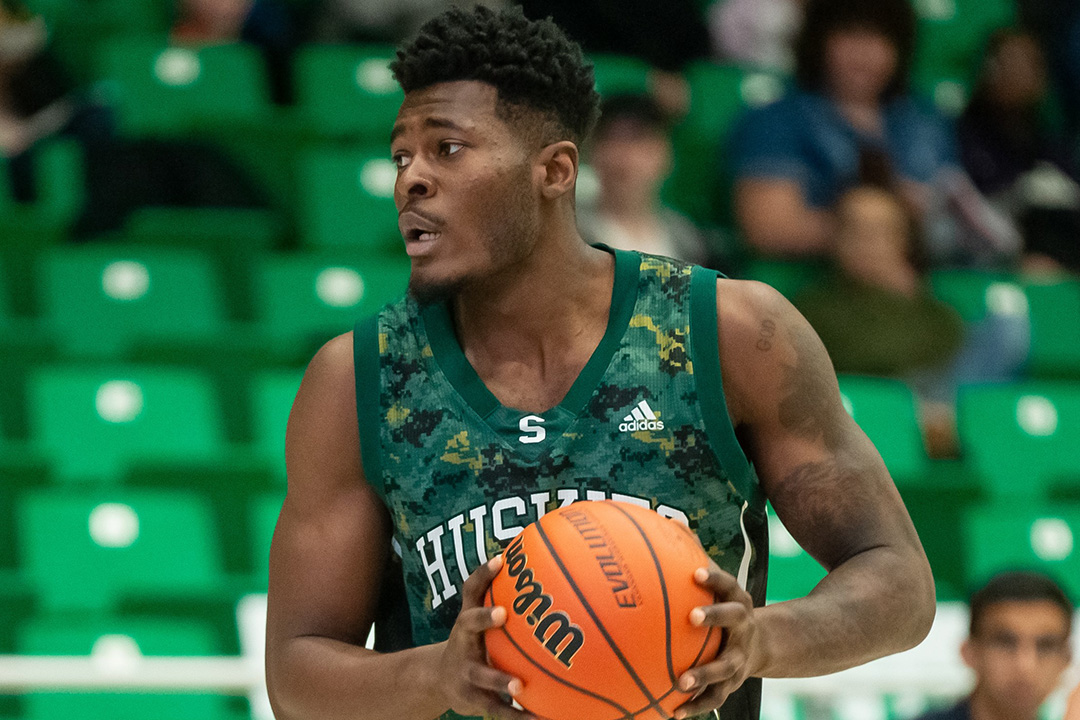
From Ghana to Canada: Huskie’s life-changing move
Coming from the tropical climate of the West African country of Ghana where daily temperatures average +30 C, Maxwell Amoafo knew he was in for a major change coming to Canada. However, nothing could have prepared him for what he faced when he landed in Saskatoon for the first time in January of 2018.
By James Shewaga“I remember it was -42 when I arrived, so it was quite a shock for me,” said Amoafo, a College of Arts and Science sociology student and fourth-year forward with the University of Saskatchewan (USask) Huskie men’s basketball team. “It was a major change, but I just had to adapt and cope with it.”
From climate to culture to cuisine, Amoafo’s adjustment to university life on another continent—both on and off the court—was significantly more challenging than for the average student. But a commitment to balancing both academics and athletics has paid off, and he hopes to take a large leap in his basketball development when the Huskies finally return to action.
“Maxwell is a terrific young man and his academics are important to him, his faith is important to him and he takes full measure in everything he does,” said Huskies head coach Barry Rawlyk. “He is not a guy to cut corners, and he is one of the hardest working individuals I have ever met. He is pretty quiet, but he is very intelligent and a very high character kid. I have a lot of respect for Maxwell for the person that he is.”
Looking back, Rawlyk is glad he took a chance on Amoafo, a powerful 6-foot-7, 220-pound forward who had limited basketball experience playing largely unstructured games on outdoor cement courts growing up in Africa. Rawlyk first learned about Amoafo from his older sister Ellen, who earned a master’s degree in public administration at USask in 2018 and wanted to bring her brother here.
“I did some homework on him and the film of him was playing on an outdoor court and it was pretty raw footage,” said Rawlyk. “But, you could certainly see the potential and the athleticism, so we exchanged emails and he was very articulate about what he wanted to do. So I took a leap and said let’s do it. That became a lengthy process with the student visa, but (Dr.) Patti McDougall (PhD) (vice-provost of teaching, learning and student experience) and Shawn Burt, the chief athletics officer at the time, were instrumental in bringing him here. I give them a lot of credit in supporting Maxwell and supporting our program to make it happen.”
Joining the team in mid-season, Amoafo had to quickly adjust to the complexities of structured play on the court for the first time, but found plenty of support from teammates and coaches.
“Playing in university was the first time for me playing real organized basketball, but my coaches and my teammates did a very good job of helping me understand the game,” he said. “I try to become a student of the game and try to understand the game more every day.”
Off the court, Amoafo’s adjustment to life at USask—while balancing a full academic and athletic load—was helped by a course he took in his first semester.
“My first year I did anthropology and I got to know people from different backgrounds and it changed my perspective about your experience, how you grew up, your background,” said Amoafo. “It was a good class for me to understand how to deal with the culture shock and everything.”
Two years later, the pandemic has provided another challenge for Amoafo. With no Huskie practices, he has missed spending time with the teammates and coaches, who have become a second family for him.
“I miss my coaches and my teammates so much,” he said. “This has been a major change for me because we are usually all together travelling, playing, practicing and seeing my teammates every day. I can’t wait to get on the court, but we all need to stay safe, until the time we can get back on the court and play the game that we love.”
With two years of eligibility remaining, Amoafo hopes to develop into an impact international player. While he has not been a major scorer on a team filled with offensive threats, Amoafo has contributed in many areas. In the Huskies’ last season in 2019/20, Amoafo led the team in shooting percentage and offensive rebounds, was third in blocked shots and fourth in steals and assists.
“Over time he has really become a lot more knowledgeable about the game and has become a very efficient contributor to the team,” said Rawlyk, who is again serving as general manager of the Saskatchewan Rattlers, with Huskies assistant Chad Jacobson coaching the Canadian Elite Basketball League team this summer. “We are looking for Maxwell’s continued growth as a player and to help some of the younger players and I really appreciate that aspect of his contribution to the team as well.”
For Amoafo, coming to USask has been nothing short of life changing.
“That was the best decision I have made because I have learned about basketball, and perspective on life and school,” he said. “We are not just athletes, we are students and we are accountable for everything we do. The privilege that I have now, after completing my education, I want to go back to help teach kids in my country of Ghana.”

